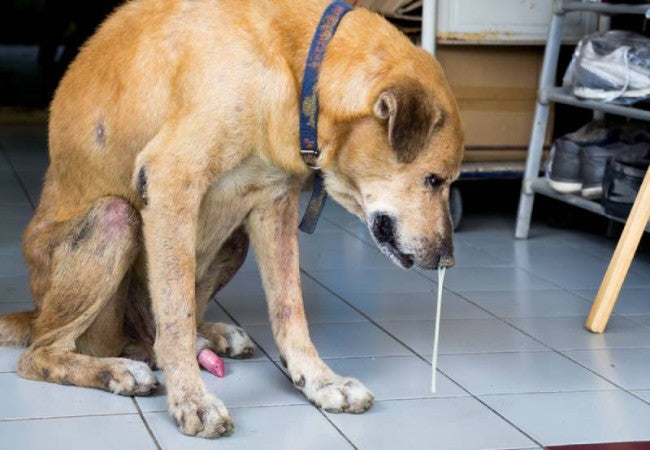A Vet’s Guide to Rhinitis & Sinus Infections in Dogs: Causes, Diagnosis & Care (2025) 🌬️🐶

In this article
A Vet’s Guide to Rhinitis & Sinus Infections in Dogs: Causes, Diagnosis & Care (2025) 🌬️🐶
By Dr. Duncan Houston BVSc
Hi, I’m Dr Duncan Houston BVSc, veterinarian and founder of Ask A Vet. Rhinitis (nose inflammation) and sinusitis (sinus infection) can make life miserable for dogs—sneezing, discharge, and face-pawing are common symptoms. As your vet, I’ve written this vet‑approved guide to help you understand the causes, recognize the signs, know what diagnostics to expect, and follow effective treatment plans. Plus, learn how Ask A Vet telehealth. 🩺🐾
1. Understanding Rhinitis & Sinusitis
Rhinitis is inflammation of the nasal mucous lining; sinusitis is its extension into the sinuses. Together, called rhinosinusitis, they impair filtering, cause congestion, and may spread infections deeper.
2. Common Causes
- Viral infections (e.g., distemper, adenovirus, parainfluenza)—common in acute cases.
- Secondary bacterial infections, often following viruses; Bordetella can act independently.
- Fungal infections—e.g., Aspergillus (common in GSDs), Cryptococcus.
- Allergies—to pollen, dust, smoke, and mold, leading to allergic rhinitis.
- Foreign bodies—grass awns or seeds that puncture the nasal passages.
- Dental disease—root abscesses near the sinuses.
- Structural issues—brachycephalic breeds and sinus cysts.
- Chronic lymphoplasmacytic rhinitis—idiopathic, immune-mediated inflammation.
3. Recognizing the Signs
- 🤧 Sneezing, snorting, reverse sneezing
- 💧 Nasal discharge: can start clear, turn mucoid, purulent, or bloody
- 😣 Facial pain: pawing at the muzzle, swelling, reluctance to eat
- 🫁 Noisy breathing, open-mouth breathing, congestion
- ✨ Conjunctivitis, lacrimation—eye watering and redness
- ⚠️ Systemic signs: decreased appetite, lethargy, fever in severe cases
4. How Vets Diagnose Rhinosinusitis
- History & exam—note discharge patterns (unilateral → bilateral) and breed predispositions.
- Imaging—CT scans are ideal; X-rays are less sensitive.
- Rhinoscopy & biopsy—direct view and tissue samples.
- Cultures & cytology—identify bacteria, fungi, or abnormal cells.
- Bloodwork & fungal titers—to rule out diseases like aspergillosis, cryptococcus.
- Dental and skull exams—check for root abscesses or trauma.
5. Treating Rhinosinusitis
5.1 Medical Therapy
- Antibiotics for bacterial infections—oral, topical, or nebulized.
- Antifungals like ketoconazole or clotrimazole infusions for fungal cases.
- Anti-inflammatories & steroids—NSAIDs or prednisone for chronic idiopathic or allergic cases.
- Antihistamines & decongestants for allergic rhinitis support.
- Nebulization & saline flushes: moisten passages, aid cleaning.
5.2 Targeted Interventions
- Foreign body removal via rhinoscopy or surgery.
- Dental work for root abscesses.
- Surgery: cysts, tumors, sinus drainage improvement.
- Radiation therapy—used in nasal tumors when surgery isn’t possible.
6. Recovery & Prognosis
- Acute viral/bacterial cases often resolve in days to weeks with early treatment.
- Chronic inflammatory cases need ongoing care; flare-ups are common.
- Fungal rhinitis—prognosis depends on early removal and antifungal success.
- Tumors—variable outcomes; early diagnostics improve chances.
- Structural fixes in brachycephalic dogs reduce recurrence.
7. At‑Home Support & Comfort
- Ask A Vet App: upload videos/discharge photos, track progress, adjust treatment remotely
- Humidifier & nasal drops: moisten airways, alleviate congestion
- Clean, dust-free environment: reduce allergens and airborne irritants
8. Real Vet Case Study
Case: Luna, a 4‑year‑old German Shepherd
Luna presented with chronic left-sided nasal discharge and nasal pain. CT and biopsy confirmed Aspergillus infection. She underwent fungal plaque removal via rhinoscopy, followed by clotrimazole infusions daily for 5 days.Ask A Vet telehealth guided weekly follow-up. After two weeks, Luna's discharge was cleared, her appetite returned, and a six-month repeat CT showed no re-infection. 🐾✅
9. FAQs
-
When should I worry about bloody discharge?
Always bleeding may signal fungus, tumor, or severe infection; see your vet promptly. -
Can home remedies help?
Humidifiers and saline help comfort—but don’t replace vet care. -
Is it contagious?
Viral cases may spread to other dogs; bacterial/fungal types are not contagious. -
How long will recovery take?
Acute infections: weeks; chronic/fungal/tumor cases: months or require lifelong management.
📌 Final Thoughts from a Vet
Rhinitis and sinusitis can range from mild annoyances to serious, chronic illnesses. Early recognition, accurate diagnostics (imaging, rhinoscopy, biopsies), and targeted treatments are key to ensuring your dog's comfort and recovery. With remote support from Ask A Vet and home, you’re well-equipped to help your pup breathe easier—and feel much better—in 2025. 🐾❤️






